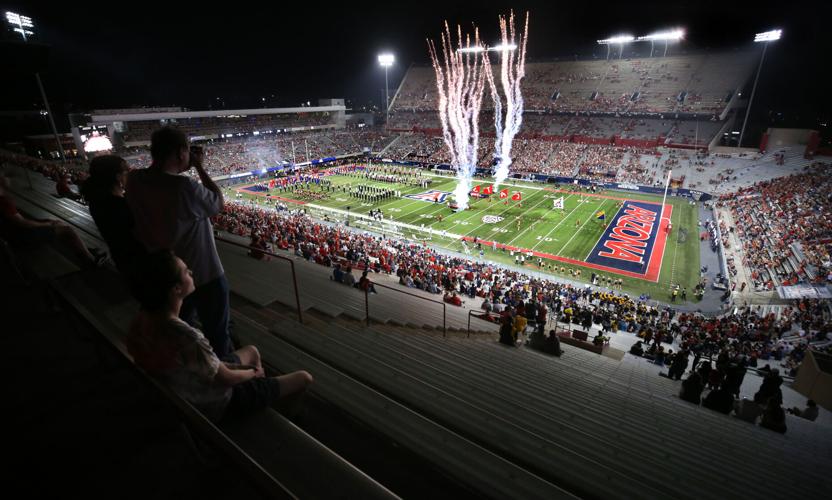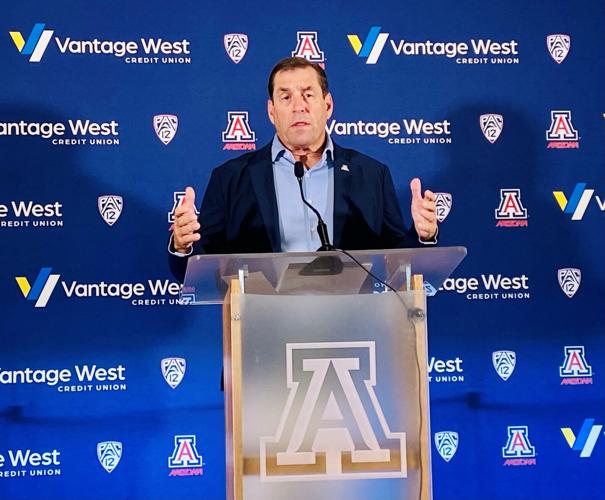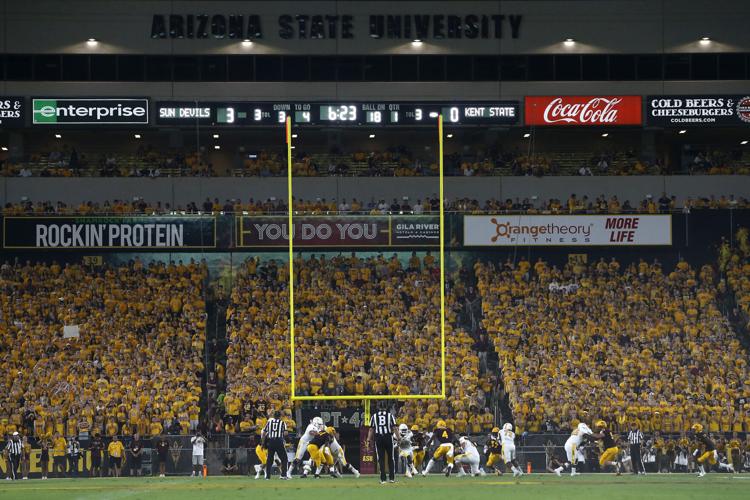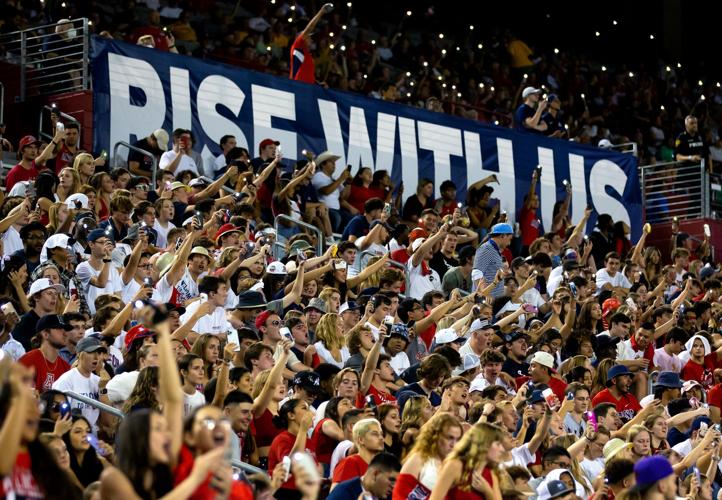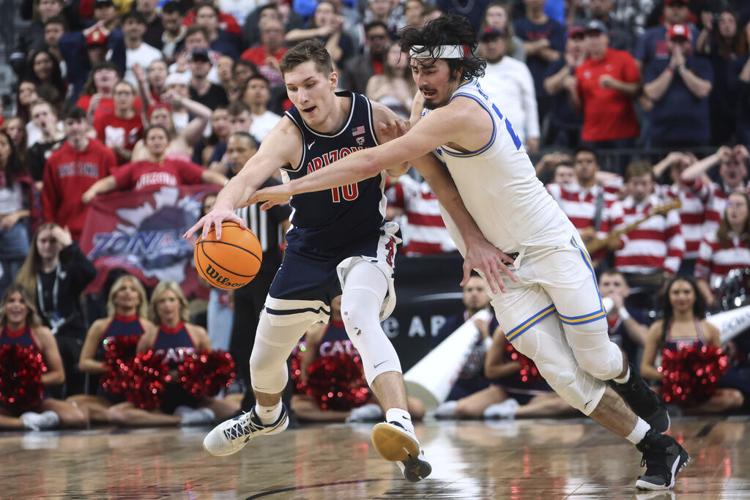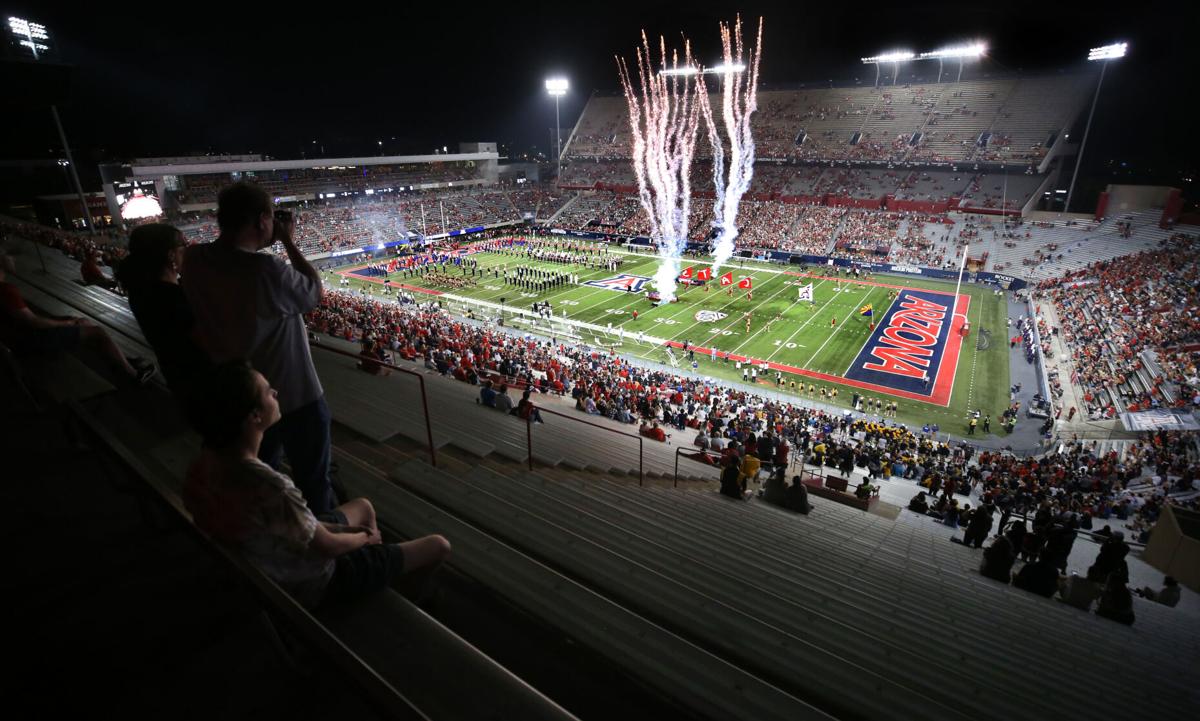Earlier this month, Arizona State University announced a multiyear naming-rights agreement for Sun Devil Stadium. ASU’s football venue heretofore will be known as “Mountain America Stadium, home of the ASU Sun Devils.
It doesn’t exactly roll off the tongue, and some have poked fun at the fact that the Sun Devils’ two biggest sporting arenas have sponsorship deals with different financial institutions; ASU plays basketball at Desert Financial Arena.
But in these times when revenue is everything for athletic departments striving to keep up with their competitors, ASU has created another lucrative stream. The 15-year deal with Mountain America Credit Union is worth more than $50 million, Sports Business Journal reported. It’s believed to be one of the largest naming-rights deals for any college football stadium.

The Sun Devil Stadium — renamed last week Mountain America Stadium, home of the ASU Sun Devils — student section keeps an eye action during ASU's August 2019 matchup with Kent State in Tempe.
The University of Arizona could use a windfall like that.
“We’re always looking for new revenue opportunities,” UA athletic director Dave Heeke said Wednesday.
But Arizona Stadium remains Arizona Stadium, even though finding a naming-rights partner is something that’s been discussed for years.
“We have internally talked about naming rights for some time, since shortly after my arrival,” said Heeke, who came to Tucson in 2017. “We’ve looked at those and examined that with our third-party rightsholders, how they can help us, what kind of naming opportunities exist. I foresee us continuing to move in that direction.
“We’re on our own timeline. We’ll make sure that we can put together the appropriate naming opportunities for our stadiums and arenas. Those are new revenue opportunities, and we’ve got to take a really hard look at them.”
Unlike McKale Center — which is named after J.F. “Pop” McKale and holds historic and nostalgic value well beyond the UA campus — Arizona Stadium has a generic name that wouldn’t require any awkward wording if a title sponsor was found.

UA athletic director Dave Heeke speaks at a kickoff luncheon at Arizona Stadium Wednesday. The Wildcats open the football season Saturday vs. NAU.
Georgia Tech recently reached an agreement with Hyundai worth a reported $55 million over 20 years. The Yellow Jackets’ football venue is now known as Bobby Dodd Stadium at Hyundai Field.
USC’s home field is technically known as United Airlines Field at Los Angeles Memorial Coliseum. USC’s deal with United is worth $69 million over 16 years.
Washington State plays at Gesa Field at Martin Stadium. Gesa Credit Union is paying WSU at least $11 million over 10 years.
As he first stated in an interview with the Star last week, Heeke envisions a “multilevel” reimagining of what he calls the UA’s “Athletic District.” It conceivably would include retail shops, real-estate development and restaurants in conjunction with refurbished — and possibly renamed — athletic facilities. Arizona Stadium’s west side is in dire need of an overhaul.
While speaking at the Sands Club inside the stadium to kick off the football season, Heeke said he pictures an “environment down here that can help everyone, that can help the community, help campus, help athletics. When you look at this (from) the professional side, they aren’t stadium deals; they’re really real-estate investment plans. I think that’s how we need to look at things as we continue to grow this side of campus.”
Heeke touched on several other topics Wednesday, including:

Members of the ZonaZoo uses their phones to light up Arizona Stadium during the fourth quarter of Arizona's Sept. 17, 2022, win over North Dakota State.
Football ticket sales
Heeke said more than 44,200 tickets have been sold for Saturday’s opener vs. NAU. The UA has sold about 500 more season tickets than a year ago, bringing the total to about 16,500. It also has sold about 1,500 more ZonaZoo passes than last year, moving that total over 11,000.
“I hope that fans out there are ready to jump all in; it’s time to be all in,” Heeke said. “That is really the next step for this football program, making this stadium rock, making this the best home-field advantage that we can for our program.
“We all know what this place is like when it’s full. It makes a difference. And this is the time. The pieces are right for our football program to really move forward. The players are there. The staff is there. The investment has been there. The commitment is there from our administration. It is all there. And I hope that our fan base really feels that.”
Football scheduling
As Heeke told the Star last week, discussions about football scheduling in the Big 12 for next season and beyond are still in the preliminary phase. But it needs to be figured out sooner than later because some schools, such as Arizona and Kansas State, have what would have been non-conference games lined up for 2024.
Heeke said there’s a push to move off those games and “find new opponents.” But it’s easier said than done.
“That’s tricky when you’re less than a year out,” Heeke said. “There’s not a lot of inventory out there. With things somewhat in flux with certain institutions” — Oregon State and Washington State, for example — “maybe there’s a few things that work. But there’s dominoes to that. Every move isn’t a straight one for one.”
Heeke reiterated that he doesn’t believe the Big 12 will adopt divisions for football. But he does think the league will take advantage of some scheduling “efficiencies” — i.e., pooling together schools that are in relatively close proximity. For instance, Arizona might be in a scheduling pod with ASU, Utah and BYU, facing those teams every year, while rotating against opponents from other pods.

Arizona forward Azuolas Tubelis, left, is defended by UCLA guard Jaime Jaquez Jr. during the second half of their game for the championship of the Pac-12 Tournament, Saturday, March 11, 2023, in Las Vegas.
Maintaining West Coast ties
This season marks the last time Arizona will face USC and UCLA on an annual basis across all sports. The UA might not face Stanford or Cal regularly either.
But Heeke said the athletic department will continue to try to schedule games in those areas because “the West Coast is critically important to our overall university — certainly to our programs, recruiting. We’ve been a ‘West Coast university.’ We’ll continue to (be) that. We have strong alumni bases throughout the West. We will look for ways in our non-conference scheduling to be in those markets, to stay connected to the West Coast. Each sport has their own scheduling models, but I think some of those traditional programs that we’ve played in the past, we’re going to look to continue that.”
Possibilities include home-and-home series and special made-for-TV events at neutral sites that are especially popular in basketball.
VIDEO: Arizona athletic director Dave Heeke speaks on a number of topics at a UA football season-opening event Wednesday, Aug. 30, 2023.


